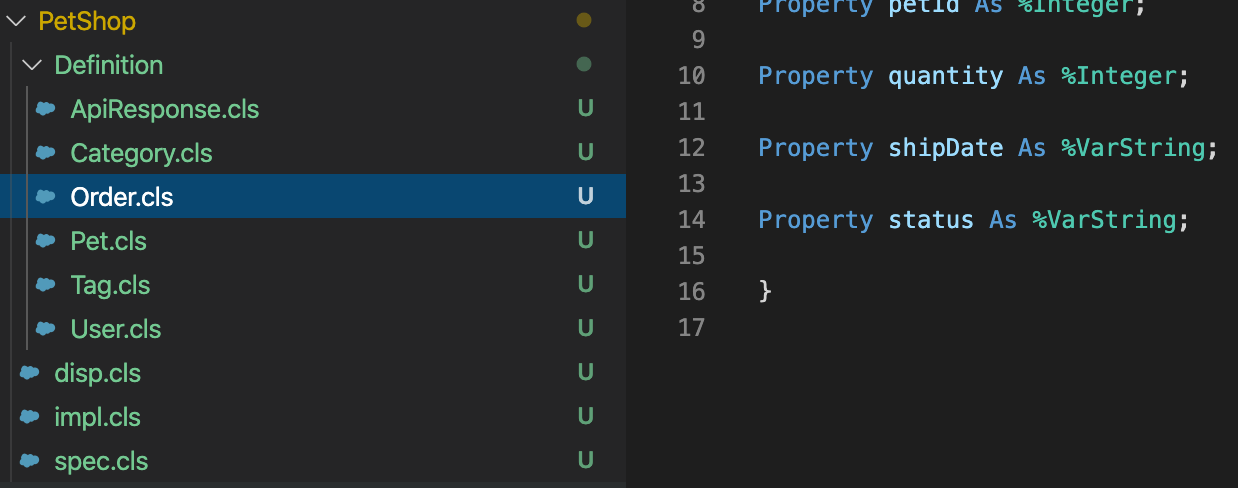ObjectScript OpenApi Definition Class Generator

InterSystems offers an API-design first approach.
You can check this post for more informations : https://community.intersystems.com/post/iris-api-explorer-application.
One practical thing about this approch and the OpenAPI specification is the definition of exchange objects.
The do ^%REST command does not create object definitions, but only routes and associated methods.
Output for the do ^%REST command for PetShop example :
REST Command Line Interface (CLI) helps you CREATE or DELETE a REST application.
Enter an application name or (L)ist all REST applications (L): PetShop
REST application not found: PetShop
Do you want to create a new REST application? Y or N (Y): Y
File path or absolute URL of a swagger document.
If no document specified, then create an empty application.
OpenAPI 2.0 swagger: https://petstore.swagger.io/v2/swagger.json
OpenAPI 2.0 swagger document: https://petstore.swagger.io/v2/swagger.json
Confirm operation, Y or N (Y):
-----Creating REST application: PetShop-----
CREATE PetShop.spec
GENERATE PetShop.disp
CREATE PetShop.impl
REST application successfully created.
Create a web application for the REST application? Y or N (Y):
Specify a web application name beginning with a single '/'. Default is /csp/PetShop
Web application name: /csp/petshop
-----Deploying REST application: PetShop-----
Application PetShop deployed to /csp/petshop
As we can see in this example, three classes were generated.
- a disp class (not accessible to the user)
- an impl class (which contains all API implementations)
- a spec class (which contains the OpenApi definition in a block XData)
What if, we could create a package that would contain all the class definitions in the specification?
This is what we are going to do with this OpenExchange application available with ZPM.
To install it with zpm :
zpm: USER>install objectscript-openapi-definition
[objectscript-openapi-definition] Reload SUCCESS
[objectscript-openapi-definition] Module object refreshed.
[objectscript-openapi-definition] Validate START
[objectscript-openapi-definition] Validate SUCCESS
[objectscript-openapi-definition] Compile START
[objectscript-openapi-definition] Compile SUCCESS
[objectscript-openapi-definition] Activate START
[objectscript-openapi-definition] Configure START
[objectscript-openapi-definition] Configure SUCCESS
[objectscript-openapi-definition] Activate SUCCESS
Then you can use the library like this :
Compiling 6 classes, using up to 8 worker jobs
Compiling class PetShop.Definition.ApiResponse
Compiling class PetShop.Definition.Category
Compiling class PetShop.Definition.Tag
Compiling class PetShop.Definition.Order
Compiling class PetShop.Definition.Pet
Compiling class PetShop.Definition.User
Compiling routine PetShop.Definition.Tag.1
Compiling routine PetShop.Definition.Category.1
Compiling routine PetShop.Definition.Order.1
Compiling routine PetShop.Definition.ApiResponse.1
Compiling routine PetShop.Definition.User.1
Compiling routine PetShop.Definition.Pet.1
Compilation finished successfully in 0.183s.
And as you can see, the classes associated with the definitions have been generated.
These generated classes take into account :
- mandatory fields
- types
- min/max values
For example you can cast a body into a definition as this :
You can find code and examples on this git repo : https://github.com/grongierisc/objectscript-openapi-definition
If you have any comments or questions, I will be happy to answer them.
Comments
@Guillaume Rongier! This is a fantastic app! I tried and it really creates 6 classes related to the API!

A very helpful feature for the spec-first approach.
And, you introduced the package just in time to the related REST API programming contest! It could help to contestants too!
![]()
![]() little wink from the intstigator ;O)
little wink from the intstigator ;O)
You should change the returned error http status to 400 or 422, instead of 500.